Bridging 17th Century Philosophy with Today’s AI and Technology.
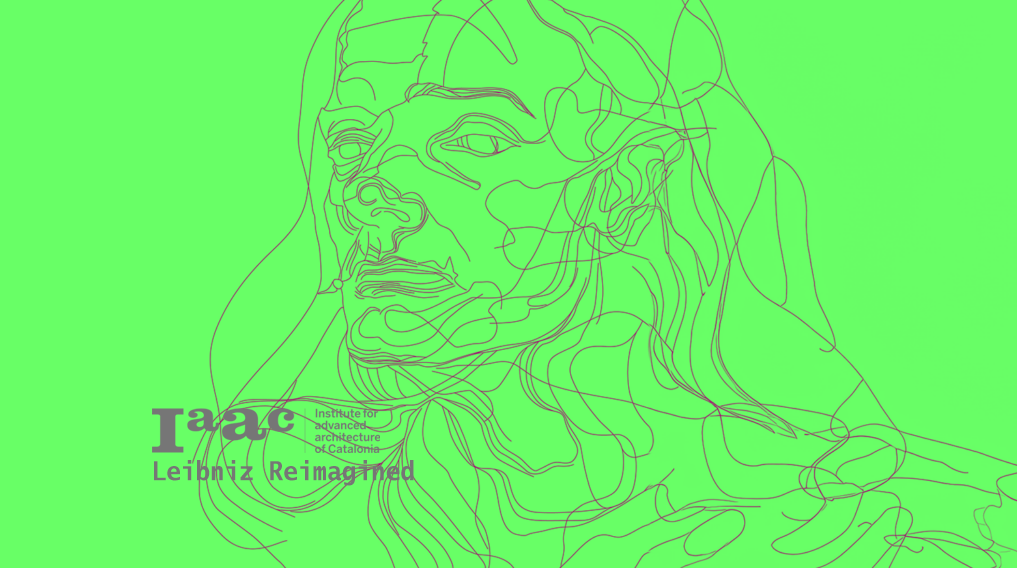
About
Gottfried Wilhelm Leibniz was a German polymath active as a mathematician, philosopher, scientist and diplomat who invented calculus in addition to many other branches of mathematics and statistics. Wikipedia
Born: July 1, 1646, Leipzig, Germany
Died: November 14, 1716 (age 70 years), Hanover, Germany
Influenced by: René Descartes, Baruch Spinoza, Aristotle, Plato · See more
Influenced: Immanuel Kant, Georg Wilhelm Friedrich Hegel · See more
Education: University of Altdorf (1666–1667), Leipzig University (1661–1666), Friedrich-Schiller-Universität, (1663–1663)

We went on a journey to the 17th century to find out which philosopher of that era had a theoretical approach that most closely aligns with today’s questions regarding AI and technology. Our conversations with different philosophers have brought us here today to Germany where we sat down for a talk with famed philosopher and mathematician Gottfried Leibniz. This movie is the result of our journey and a visual imagining of our findings.
Human vs. AI Intelligence:
- Emotional Intelligence / 75% of executives believe AI cannot match human creativity and empathy.
- Creativity: Only 22% of AI professionals think AI can replicate human creativity.
AI’s Societal Impact:
- Economic Contribution / AI could add $15.7 trillion to the global economy by 2030.
- Job Outlook: While AI may displace 85 million jobs by 2025, it’s expected to create 97 million new jobs, especially in tech fields.

Idea:
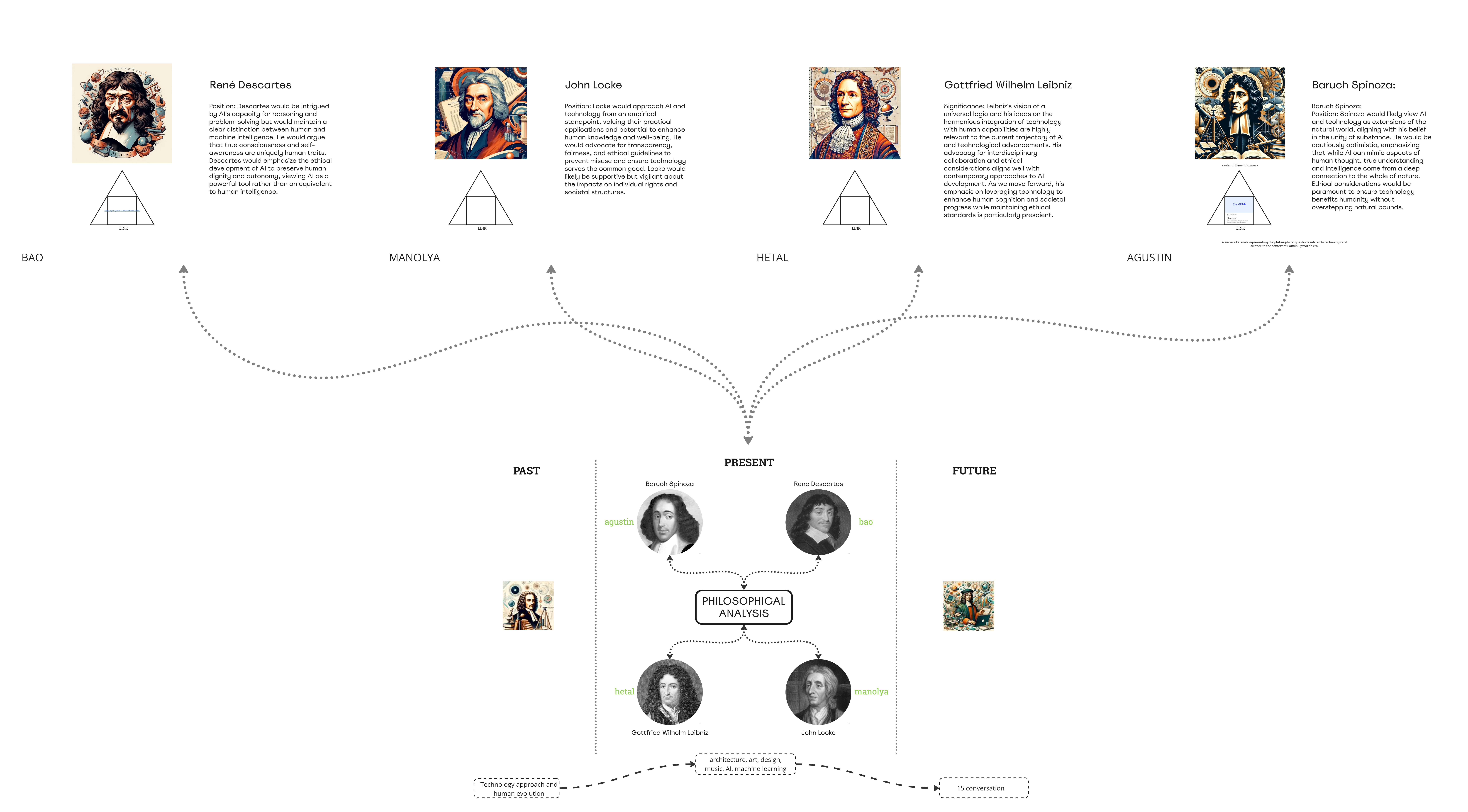
Philosophy Theory


Theorical Workflow
In our quest to understand how 17th-century philosophical insights align with contemporary questions about AI and technology, we examined the positions of four prominent philosophers: Baruch Spinoza, John Locke, René Descartes, and Gottfried Wilhelm Leibniz. Here’s a summary of their hypothetical positions and our findings.
1. Baruch Spinoza: Position: Spinoza would likely view AI and technology as extensions of the natural world, emphasizing their ethical implications. He would see potential in AI for enhancing human well-being but would be cautious about AI’s ability to truly replicate human understanding and emotional depth.
2. John Locke: Position: Locke would approach AI from an empirical standpoint, valuing its practical applications in education, medicine, and daily life. He would advocate for transparency, fairness, and ethical guidelines to ensure AI serves the common good, while also being vigilant about the impacts on individual rights and societal structures.
3. René Descartes: Position: Descartes would be intrigued by AI’s reasoning capabilities but would maintain that true consciousness and self-awareness are uniquely human traits. He would view AI as a powerful tool that supports human autonomy and dignity, emphasizing the ethical development of AI to preserve human uniqueness.
4. Gottfried Wilhelm Leibniz: Position: Leibniz would be enthusiastic about AI’s potential to advance knowledge and logical reasoning. He would see AI as a realization of his ideas on universal logic and computation, advocating for ethical integration and interdisciplinary collaboration to ensure AI harmonizes with human values and societal goals.
Diagram of the idea.
Conclusion:

The Most Relevant Philosophers
Leibniz:
- Significance: Leibniz’s vision of universal logic and harmonious integration of technology with human capabilities is highly relevant today. His advocacy for ethical considerations and interdisciplinary collaboration aligns well with contemporary approaches to AI development. His emphasis on leveraging technology to enhance human cognition and societal progress while maintaining ethical standards makes him particularly prescient for the future of AI and human evolution.
- Spinoza: Focus on ethics and harmony with nature, cautious optimism.
- Locke: Emphasis on practical benefits, empirical approach, and ethical guidelines.
- Descartes: Distinction between human and machine intelligence, focus on consciousness and autonomy.
- Leibniz: Computational logic, ethical integration, interdisciplinary collaboration.
Refined Conclusion:
- Leibniz stands out for his foresight in computational logic and the importance of ethical integration, central to AI’s future.
- Locke provides a significant match for the practical, ethical, and societal integration of AI, complementing Leibniz’s theoretical strengths.
Thus, while Leibniz’s ideas significantly match the theoretical and computational aspects of AI’s future, John Locke’s focus on practical benefits and ethical guidelines also aligns closely with contemporary and future trends in AI. This dual perspective from Leibniz and Locke offers a comprehensive view of the challenges and opportunities in AI and human evolution over the next century.
Process
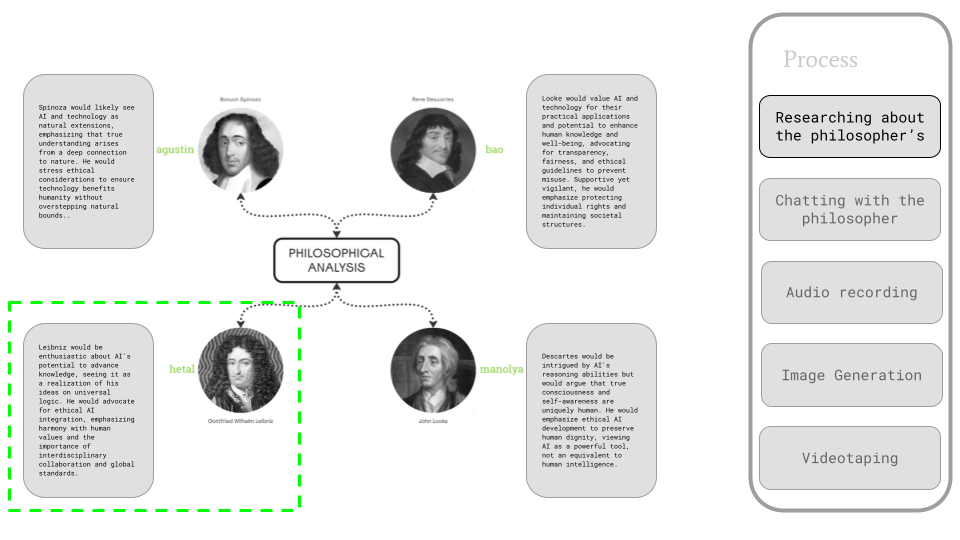
Philosopher selection

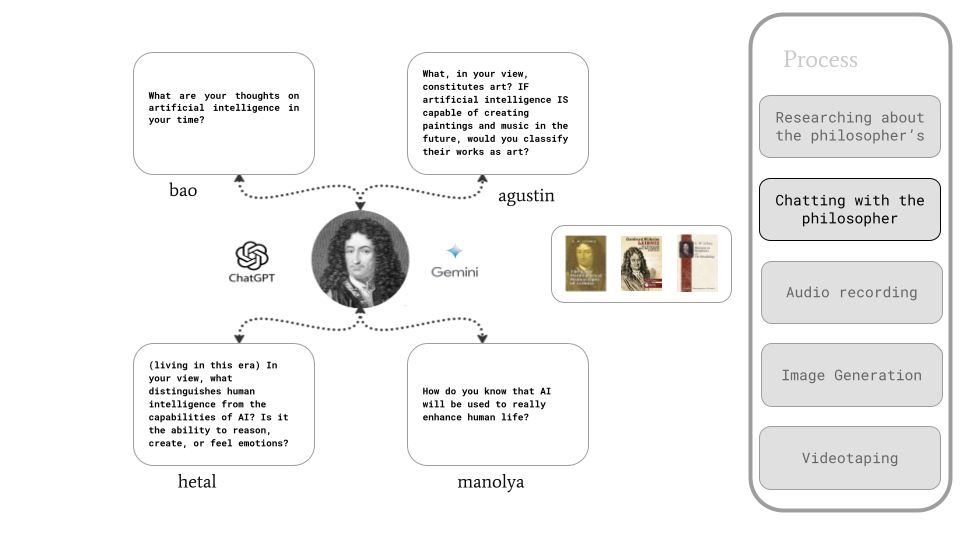
Theorical Approach of his Philosophy and Conversations

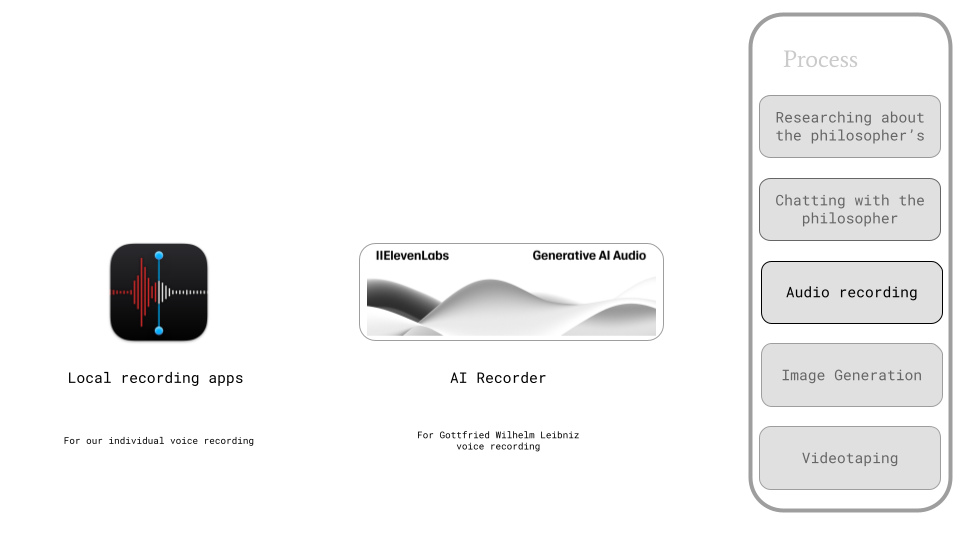
Recording the conversations

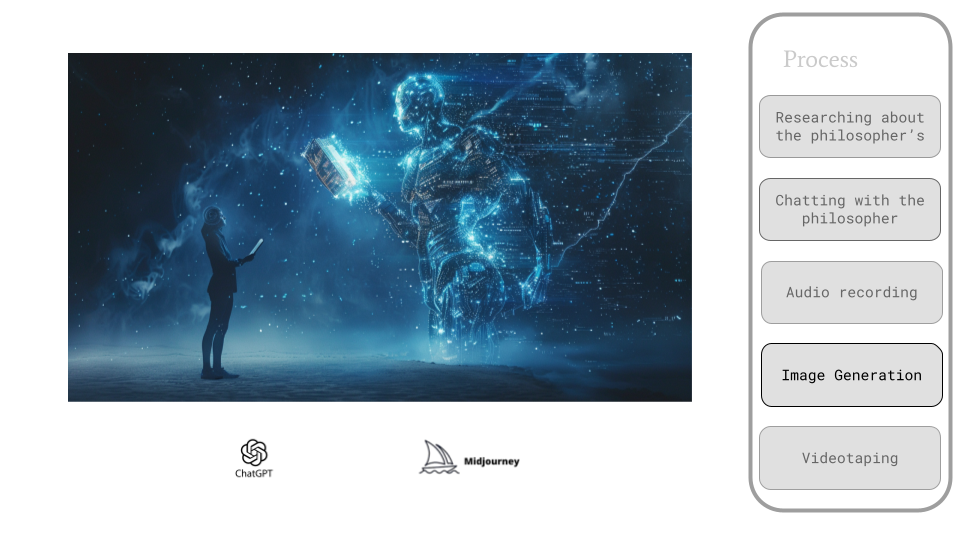
Visualization of his ideas

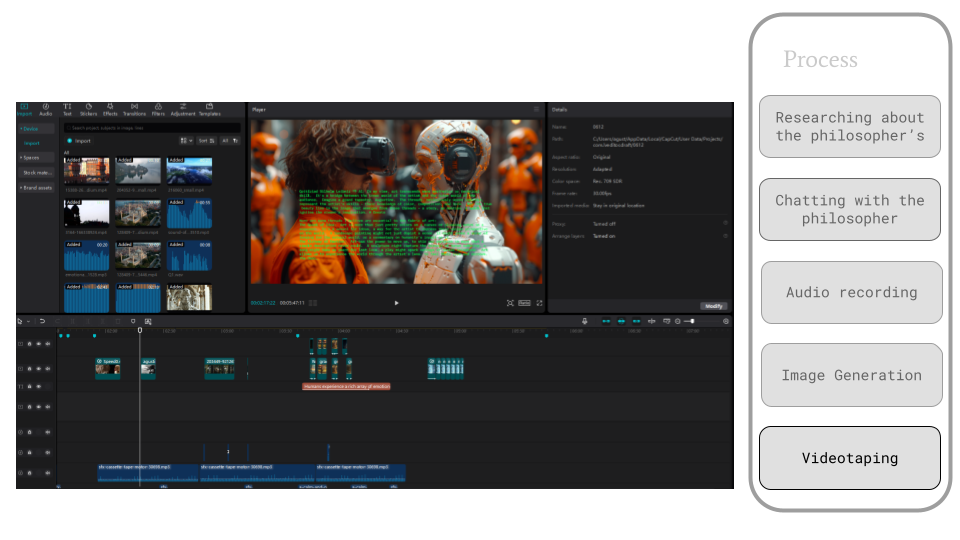
Film Editing

We asked specific questions in the interview to Leibniz:
Question 1:
Hi, What are your thoughts on artificial intelligence in your time?
Leibniz Answer: “The very conception of automata capable of simulating human intellect aligns with my endeavors in crafting calculating engines and the development of a universal machine. However, such contrivances remain in their nascent state. Yet I envisage a future wherein these mechanical aids might not only augment but possibly eclipse human reasoning faculties. Nonetheless, the considerations of the Soul’s Essence and the moral rectitude of such advancements persist. It is imperative that these inventions be directed towards the betterment of mankind lest they lead us astray.”
Question 2:
Thank you for being here today. I’m curious what are your thoughts about art and artificial intelligence?
Leibniz Answer: “In mine own estimation, art doth surpass the bounds of mere aesthetics and craft. It serves as a conduit betwixt the inward realm of the artist and the external sphere of the spectators. Envision, if you will, a vast tapestry, Augustine. The strands, artfully interlaced, symbolize the artist’s prowess—their mastery of hue, structure, and shape. Yet, the genuine splendor emerges from the visage that the threads compose—a narrative, a sentiment, a spark that kindles the imagination of those who behold it.” how do you know AI can really express the uniqueness of sculpting a base of clay from the earth and create an emotional peace that resonates with the world?
If AI can achieve this level of sentience, if it can bridge the gap between the programmed and the profound, then perhaps its creation could be considered art in the truest sense. But until then, the question remains open. However, this doesn’t diminish the potential of AI in the art world.”
Illustrated Process:
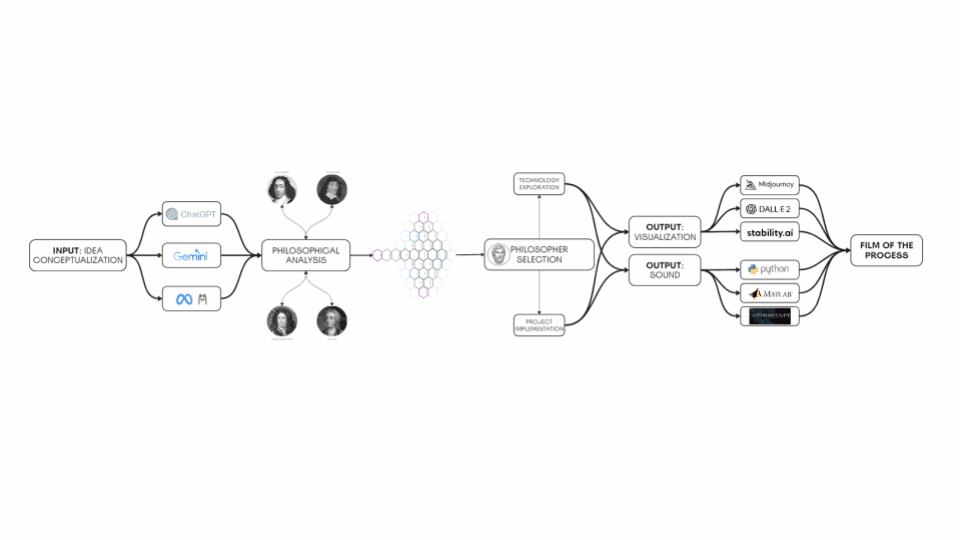
Question 3:
I wanted to ask you as we have already talked about the technology and evolution living in this era, in your view what distinguishes human intelligence from the capabilities of AI? Is it the ability to reason, create, or feel emotions?
Leibniz Answer: “Humans partake of a diverse tapestry of sentiments such as love and melancholy which profoundly influence our perceptions, our consciousness of self, and the capacity to reflect and query our very existence. These shape our Essence. Driven by such emotions and experience, human creativity begets art and music that emotionally unite us. Empathy engenders profound connections and communal ties, permitting us to partake of others’ emotions. These characteristics forge the human spark that no artificial intelligence can mimic, rendering the Human Experience uniquely invaluable and irreplaceable.”
Question 4:
Your responses lead this were profoundly insightful… however it compels us to consider the implications for the future. How do you know that AI will be used to really enhance human life?
Leibniz Answer: “Artificial intelligence, akin to the printing press, harbors vast potential for the advancement of humankind. Yet, as a tool acts at the behest of its bearer, so too does the impact of AI depend upon our sagacity. Might it liberate us for more noble endeavors, unveil the mysteries of Nature, and steer us towards a more splendid world? The crux lies not within the capabilities of AI but in our very intentions. If wielded with ethical restraint, AI might herald a new golden era. Yet if employed amiss, it stands to become a bane. Our persistent quest for knowledge and rationality is paramount.”
Illustrated Process:
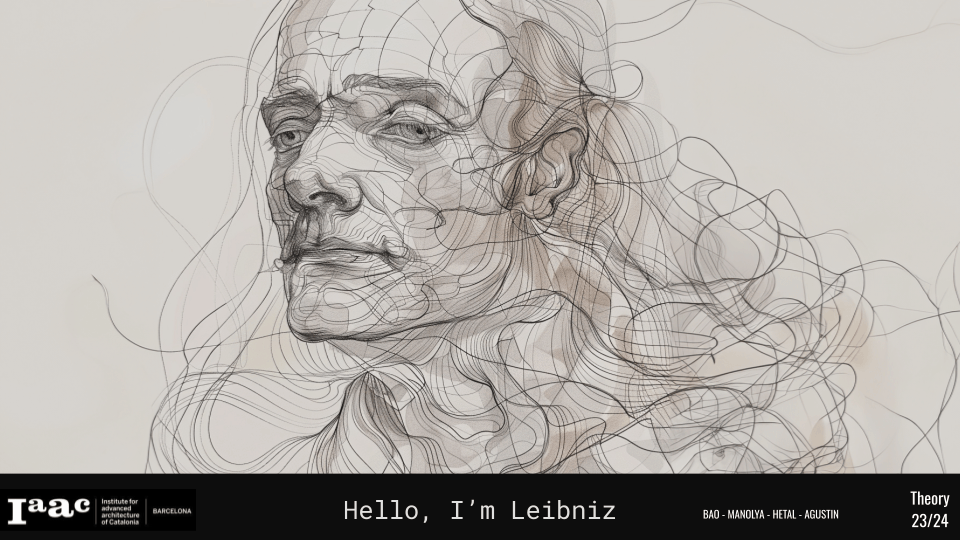

AI Theory Seminars
Project Team:
- Bao Q. Trinh
- Manolya Nielsen
- Hetal Bharwanu
- Agustin Salas
Leibniz Reimagined A Journey Through Time and Thought is a project of Iaac, Institute for Advanced Architecture of Catalonia developed at Master in Advanced Computation for Architecture & Design in 2023-24 by Students: Agustin Salas, Bao Q. Trinh, Manolya Nielsen and Hetal Bharwanu, under the supervision of Faculty: Mark Balzar, Zeynep Aksöz.

